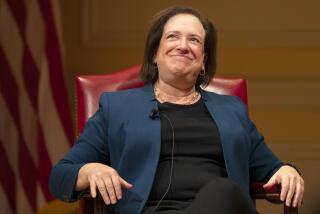Grodin Asserts Independence of State Court
SAN FRANCISCO â Former state Supreme Court Justice Joseph R. Grodin, replying to critics of âjudicial activism,â on Saturday defended state high court decisions that have granted greater constitutional protections than required by the U.S. Supreme Court to criminal defendants and other individuals
Grodin said that when the California court invokes the state Constitution, it is not obligated to defer to the federal courtâs interpretation of similar provisions of the U.S. Constitution--a contention made most prominently by Chief Justice Malcolm M. Lucas, the new leader of a recast state high court.
While not mentioning Lucas by name, Grodin sought to refute criticism Lucas made of state court independence in a case the justices decided last year.
âThere seems to me no reason in principle why a court of one jurisdiction ought to defer to the meaning attached to a different document by a different court, even if that court is the Supreme Court of the United States,â Grodin said in a speech before the American Judicature Society, meeting here in conjunction with the American Bar Assn.
âIndependent State Groundsâ
Grodin said that what is known as the âdoctrine of independent state groundsâ for a state Supreme Court decision âis here to stay.â
âIf the federal courts will stay off our turf, weâll stay off theirs,â he said.
Grodin, along with former Chief Justice Rose Elizabeth Bird and Justice Cruz Reynoso, left the court in January after defeat by the voters last fall. The 56-year-old former justice now teaches at Hastings College of the Law here and is writing a book.
Gov. George Deukmejian, a leading critic of the Bird court, has appointed three new justices and elevated Lucas to the top post, placing conservatives in the majority on a court that had been dominated by liberals for decades.
In the past, the court, with Justice Stanley Mosk playing a leading role, had frequently asserted âindependent state groundsâ to give individuals more liberties under the state Constitution than the federal high court mandated under the U.S. Constitution.
Extend Protections
Among other things, the court has extended greater protections against unlawful searches, granted political activists the right to circulate petitions at privately owned shopping centers and established a right for low-income women to obtain state-financed abortions.
Over the years, the doctrine has been criticized by Lucas and other justices who were in the minority on the old court--and it is now being reconsidered by the new court in a case involving a key test of Proposition 8, the so-called victimsâ bill of rights.
At issue in that case is whether the measure, passed by the voters in 1982, requires the state court to defer to U.S. Supreme Court rulings on the admissibility of improperly obtained confessions. The state court already has held that under the initiative it must follow federal decisions on the use of evidence from illegal searches.
In his speech, Grodin said he had become a âtrue believerâ in state court independence. But he acknowledged that there is âprobably some strain on the rule of law as it is perceived by the publicâ when different judges give different meanings to essentially the same language in the state and federal constitutions.
Nonetheless, critics are wrong when they say that such state court disagreement with the federal court âconstitutes unjustified activism,â he said. âI believe this criticism does not have merit.â
Confession an Issue
Grodin cited as an example a case last fall in which Lucas vigorously dissented from a ruling that barred the use of a confession from an accused drug peddler who was not told by police that his lawyer was at the station house and wanted to see him.
The majority opinion, written by Grodin, cited the state Constitutionâs protections against the use of improperly obtained confessions and brushed aside a ruling by the U.S. Supreme Court allowing the use of a similar confession under the federal Constitution.
Lucas, in an 18-page dissent, said that he objected to invoking the state Constitution âwhere the language of the applicable provisions is almost identical to the federal Constitution, and without some greater showing of an independent state interest needing additional protection.â
Grodin--still not mentioning Lucas by name--conceded that Lucasâ dissent was âexcellentâ and that legal experts âmight well find it persuasive.â
But he said that in his view there was no more reason for the state court to defer to the federal courtâs analysis of the issue than for the federal court to defer to the state court.
Grodin took note of an increasing tendency by state courts throughout the country to rely on their own state constitutions, remarking that this trend in expanding individual rights âhas corresponded with something of a recession in the federal constitutional arena.â
More to Read
Get the L.A. Times Politics newsletter
Deeply reported insights into legislation, politics and policy from Sacramento, Washington and beyond. In your inbox three times per week.
You may occasionally receive promotional content from the Los Angeles Times.










